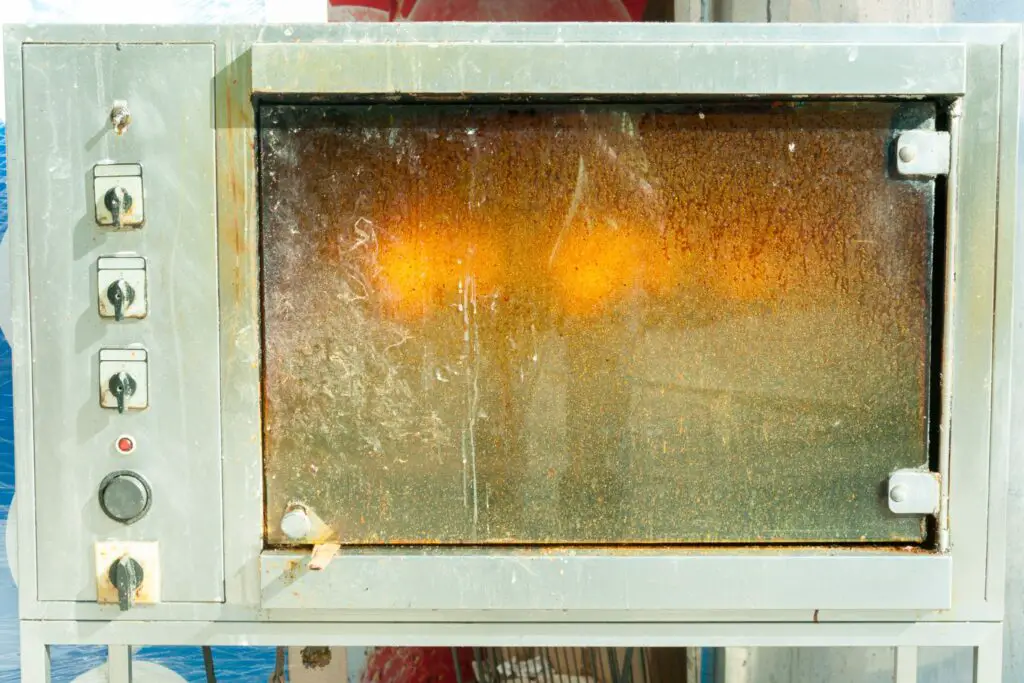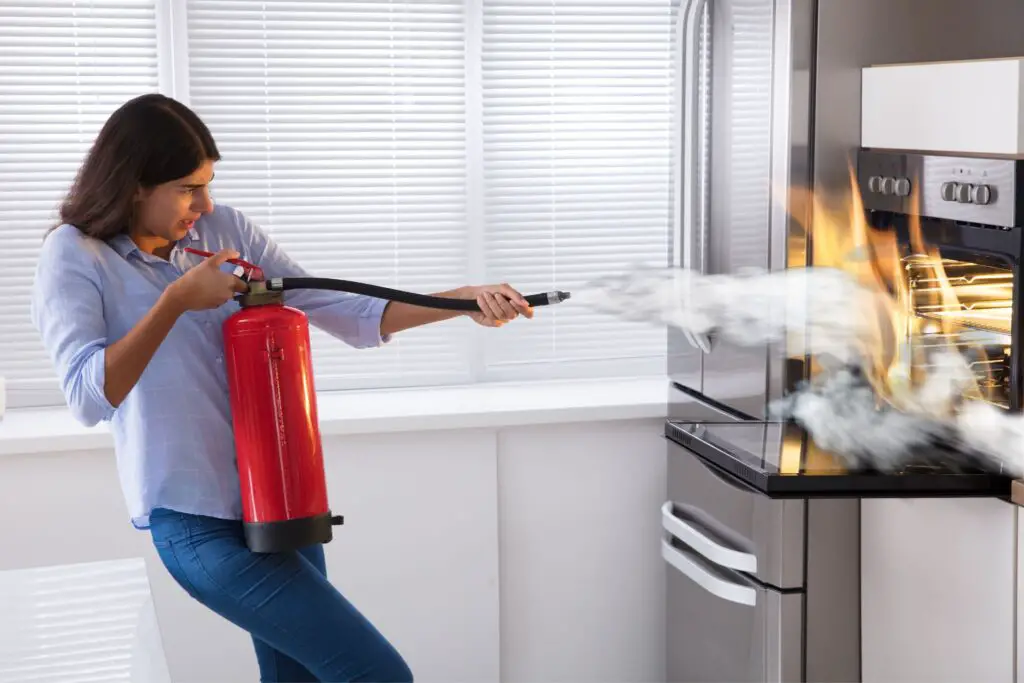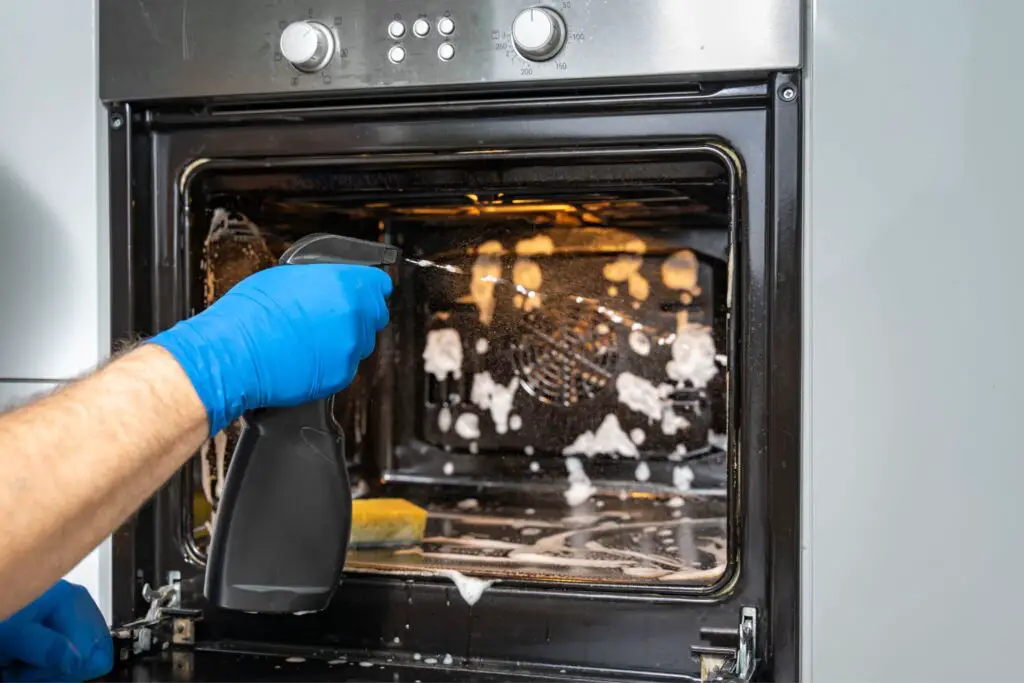Originally Created on: June 12, 2023 @ 9:10 am
How do you put out a fire in your oven? Have you ever experienced the panic of seeing a fire suddenly blazing in your oven while cooking?
In this guide, we’ll explore the steps you need to take to safely extinguish an oven fire and prevent it from causing further damage to your home and appliances.
The modern oven is a kitchen staple, allowing us to bake, roast, and broil our favorite dishes easily. However, despite its convenience, the oven also presents some potential hazards.
Food particles and grease can build up over time, increasing the risk of a fire breaking out within the oven.
Understanding the causes and preventative measures for oven fires is crucial for maintaining a safe and efficient kitchen environment.
As we delve deeper into this topic, we’ll discuss practical tips and techniques for putting out oven fires and ensuring the safety of your household.
You May Also Like: Is It Safe To Put Aluminum Foil In The Oven? [The Brutal TRUTH + 4 Tips]
Table of Content
How Do You Put Out a Fire in Your Oven?
To put out a fire in your oven, follow these crucial steps to ensure safety and minimize damage:
1. Remain calm: Upon discovering an oven fire, the first step is to stay calm and avoid panicking. Panic can lead to poor decisions that may aggravate the situation.
2. Turn off the heat: Promptly turn off the heat source by switching off the oven. This action will prevent further fueling of the fire.
3. Keep the oven door closed: Keep the oven door closed during this process. Opening the door may introduce more oxygen into the oven, causing the fire to grow and potentially spread to other kitchen areas.
Most oven fires will die once the heat source is turned off and the fire is contained within the oven.
4. Use a fire extinguisher: If the fire persists or begins to spread, use a fire extinguisher specifically designed for kitchen fires (Class K) or a multi-purpose extinguisher labeled A-B-C.
Ensure you know how to operate the extinguisher beforehand, following the PASS method: Pull the pin, Aim at the base of the fire, Squeeze the handle, and Sweep from side to side.
Other ways to deal with an oven fire include:
- Regularly clean your oven to prevent the buildup of grease and food particles, which can ignite and cause fires.
- Always have a fire extinguisher readily available in your kitchen, and ensure all household members know how to use it.
- Install a smoke detector near your kitchen to alert you of potential fires.
- In the case of a small fire, you may also use baking soda to smother the flames. However, use water or flour sparingly, as they can worsen the situation.
What Would Cause an Oven Fire?

Oven fires can occur for various reasons, including grease buildup, food debris, and faulty electrical components.
Understanding the common causes of oven fires can help prevent dangerous situations and ensure kitchen safety.
Grease accumulation and food particles inside the oven primarily contribute to oven fires. When exposed to high temperatures, these residues can become flammable and ignite.
To avoid this, clean the oven regularly, removing any grease or food remnants that might fuel a fire.
Faulty electrical components or wiring can also lead to oven fires. Damaged or frayed wires may generate sparks, causing ignition within the oven. Periodic inspection of the oven for signs of wear or malfunction is essential.
If an electrical issue is suspected, it is advisable to consult a professional technician for assistance, as attempting to repair electrical problems without proper knowledge can be dangerous.
Do You Use Water to Stop an Oven Bake Fire?
Using water to stop an oven-bake fire is not recommended, as it can worsen the situation and create additional hazards. Instead, there are safer alternatives for extinguishing oven fires.
During an oven bake fire, using water can spread the fire and even cause a steam explosion.
This dangerous reaction occurs when water comes into contact with hot surfaces, burning grease, or oil, rapidly turning into steam and scattering burning droplets.
Additionally, using water on an electrical fire increases the risk of electrocution and other electrical dangers.
So, do you use water to stop an oven fire? The answer is no. Instead, safer alternatives include:
- Turning off the heat source.
- Keeping the oven door closed to deprive the fire of oxygen.
- Using a Class K fire extinguisher or baking soda to smother the flames.
Can an Electric Oven Catch Fire?

Electric ovens are generally considered safer than gas ovens, but they can still catch fire under certain circumstances.
To prevent an oven fire from occurring, clean the appliance regularly and inspect it for any signs of wear or malfunction.
Can an electric oven catch fire despite these precautions? Yes, but having a readily available fire extinguisher and smoke detector can help alert you of potential fires and enable you to act quickly.
Also Read: Does A Gas Stove Use Electricity For The Oven? [BEST Answer + 3 BONUS Tips]
Remember to stay calm in a fire incident and follow the steps to extinguish the flames safely.
By taking preventative measures and following the appropriate safety protocols, you can ensure your kitchen remains safe and free from danger.
Regular maintenance and prompt attention to any issues will significantly reduce the risk of electric oven fires and contribute to a secure cooking environment for you and your loved ones.
How to Clean Oven After Fire

Dealing with the aftermath of an oven fire can be overwhelming, but it is essential to clean the appliance properly to prevent further damage and ensure future safety.
Following a few simple steps, you can restore your oven to its previous condition and minimize any lingering effects from the fire.
See: How To Clean My Portable Dishwasher [ULTIMATE Guide + 8 Steps ]
The first step in learning how to clean the oven after the fire is to ensure the oven has cooled down completely and disconnected from the power source. That will help prevent any injuries or electrical hazards during the cleaning process.
Next, remove any food remnants, debris, or charred materials using a brush or scraper. Be cautious not to scratch the oven’s surface, and avoid using water on any electrical components.
Once the debris is cleared, create a cleaning solution by mixing equal parts of vinegar and water. Apply this mixture to the interior surfaces of the oven, avoiding any electrical components, and let it sit for a few minutes.
Then, use a sponge or cloth to wipe down the surfaces, removing any residue or soot. If necessary, repeat the process until the oven is thoroughly cleaned.
Conclusion
Understanding how to respond to oven fires is crucial for ensuring the safety of your household. The key takeaway is that using water to extinguish an oven fire can be dangerous and lead to more severe consequences.
Instead, turning off the heat source, keeping the oven door closed, and using a Class K fire extinguisher or baking soda to smother the flames is the way to go.
So, how do you put out a fire in your oven? These simple yet effective steps can help prevent the fire from escalating and protect your kitchen from further damage.
Regular maintenance, cleaning, and safety measures will help minimize the risk of oven fires and ensure a secure cooking environment for you and your loved ones.

![How Do You Put Out A Fire In Your Oven? [The ULTIMATE Guide +4 Tips]](https://mykitchenapex.com/wp-content/uploads/2023/06/How-Do-You-Put-Out-A-Fire-In-Your-Oven-The-ULTIMATE-Guide-4-Tips.jpg)